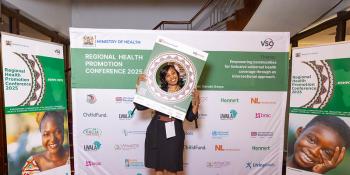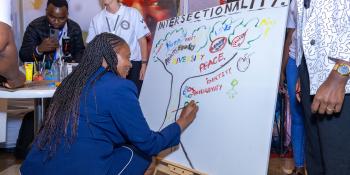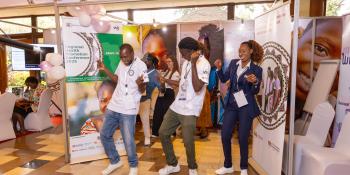Fatima Al Hassan is part of a new generation of female farmers in Nigeria. In the past two years, Fatima has gone from cash-strapped housewife to successful entrepreneur, and is helping fight gender inequality along the way.
“In society, there's this perception that women are below men. When I was growing up, I thought this would never affect me, that my life would be different to my mother’s.
“But when I got married, I ended up becoming a housewife, like the generation before me.”
Two years ago, VSO volunteers taught Fatima how to turn farming into a business, and how to manage her finances.
“When I started the training, my goal was to stop depending on my husband, and become self-reliant.”
Hear Fatima talk about her journey to financial independence:
"My husband used to see me as irrelevant"
Fatima started to grow maize and soya beans and, using what she’d learnt, began to process the maize and cook it up into masa. Fatima also makes tomato stew and popcorn now.
Through financial literacy training, Fatima was taught how to look after her new earnings, by saving some of her income for emergencies, and encouraged to discuss her finances with her husband.
“My husband used to see me as irrelevant in terms of financial planning at home.
“The training paved the way for me to discuss financial matters with my husband. One of the major things we learned in the training is that we are equal to men.
“Now I'm making money, my husband has started to recognise I need to be involved. We've put the social barrier aside so we can make decisions together."
“I now understand my rights as a woman”
“I wouldn't want my own daughter to marry somebody that would treat her as just a housewife. Men need to change their way of thinking. That’s why I’m teaching my sons that men and women are equal,” said Fatima.
“I can support my children, by paying their school stipend and covering the household needs.”
But that’s not all – with the money that she’s earned, Fatima is fulfilling her long-held dream.
“Last year I joined a course in nutrition at a school in Mokwa with the money I’ve been earning. It’s teaching me how to cook different varieties of food which I can then sell. Without the training, I would never have had this opportunity, I would have stayed a housewife. It's changed my life.”
“This project has helped me to understand my rights as a woman, and I’m passing on the knowledge from the gender training to my own children, and to children in the neighbourhood.
“I wouldn't want my own daughter to marry somebody that would treat her as just a housewife. Men need to change their way of thinking. That’s why I’m teaching my sons that men and women are equal.”
SHARING SKILLS
Since 2014, VSO volunteers have trained more than 4,000 people in Nigeria on the following skills:
- Farming: How to plant crops to make the most of the land and get the biggest yields
- Adding value to crops: How to process crops into marketable products to get a higher price
- Group strengthening: Supporting co-operatives to pool their crops to command a higher market price
- Financial literacy: Providing basic information on income, savings and how to better manage your money
Read more

In photos: Our Regional Health Promotion Conference 2025
Check out some of our favourite photos from Regional Health Promotion Conference (RHPC25). This event sought to reimagine Universal Health Coverage through the lens of intersectionality.

Using intersectionality to create healthy beginnings and hopeful futures
World Health Day brings global attention to the urgent need to end preventable maternal and newborn deaths. Learn more about how our Regional Health Promotion Conference is tackling these issues head on.

Highlights from the Regional Health Promotion Conference 2025
The Regional Health Promotion Conference 2025 reimagined Universal Health Coverage (UHC) through the lens of intersectionality, by bringing together experts from across East Africa and beyond.
